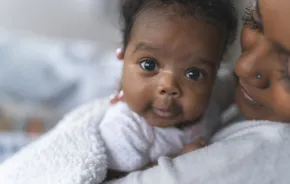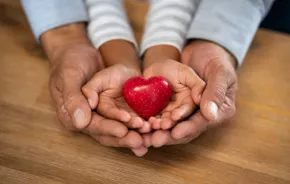
My husband and I have different last names. My last name is the one I was born with, and I’ve never considered changing it. But when I became a mother, my last name took on greater significance. I’m one of four sisters, and our family name would end with us.
Or rather, it might have ended with us, but now it won’t, thanks to my son.
Yes, my husband and I gave my son my last name. My maiden name, the one I kept, remember?
In liberal Seattle, these kinds of naming decisions are mostly non-controversial — and anecdotally, at least, seem relatively common. But for the nation as a whole, the story is different, with some surprising twists and turns over the last 40 years.
Once radical, still rare
The story of my own decision to keep my maiden name and then pass it on to my son starts in the 1970s. Growing up in Puget Sound, I was surrounded by moms who volunteered at Planned Parenthood and dads who lobbied for environmental education in public schools. Though my mother took my dad’s last name, many of her married friends kept their own names. I didn’t think anything of it — to me it was normal to be surrounded by families with a variety of surnames — but looking back, it's clear that members of my parents' crowd were influenced by the feminist politics of the time.
In the 1970s, during the Second Wave of feminism, about 17 percent of married women kept their maiden names, according to a 2015 New York Times’ Upshot column, which drew data from a Google Consumer Survey and other sources. This was a radical choice. Until the mid-1970s, some state laws still required a woman to use her husband’s name to vote, do banking or get a passport. Any married woman who kept her maiden name did so against longstanding social convention, and her choice was deliberate.
Studies indicate that the share of women keeping their surnames rose by the 1990s, but dipped again in the 2000s before rising again in the last decade. Now, an estimated 20 percent of married American women keep their birth last name and another 10 percent opt to hyphenate or legally change their name but keep their maiden name professionally, according to The New York Times.
Why such slow change? It’s unclear but it seems that despite societal changes, tradition looms. One study, for example, found men were more likely than women to associate a woman's surname choice with her love for, and commitment to, her partner.
Women, of course, decide to keep their names for a variety of reasons, from professional reasons to the trend of getting married later in life.
Tracy Moore, a staff writer at Vocativ and contributor at Jezebel who has covered women's issues and naming conventions, says that the choice of surname is related to education, income and profession. We live in an era, she says, where women have "the economic power to choose not to merge identities as they would have easily decades ago."
“When women can support themselves, have an established identity in a career field and are highly educated, what's the incentive — other than tradition?” adds Moore.
The rise of legal gay marriage has also made a difference as couples seek new naming options that reflect their union. For Ann* and Maureen*, a North Seattle couple who are parents to a 6-year-old boy, there was no question of dropping either of their surnames when they married. “Because we don’t have a traditional relationship, it was easy to keep our names,” says Ann. “Neither of us has a husband!”
 But what about the kids?
But what about the kids?
Back to my own marriage, and ensuing parenthood. I fit the stereotype outlined above: I’m college educated, I married in my 30s, and I’m socially liberal. Additionally, my husband happens to bear his mother’s last name. In fact, it was his idea to give our son my last name. And we were lucky that Washington State law protected our decision.
Prior to the 1970s, many state laws dictated a child bear the father’s name no matter the circumstance. Restrictions still apply in certain states; for instance, Louisiana’s naming law states a child of a married couple must have the husband’s last name unless the couple agrees to the mother’s name or some combination of the two names.
Such rules don’t seem to reflect current beliefs about naming. A 2002 study published in The Social Science Journal, of university staff families found people cared less and less about a family sharing the same last name.
More recently, BabyCenter.com’s ongoing poll on the subject finds more than half of the 105,000 respondents to date say they either combined both parent last names (21 percent) or gave the child the mother’s last name (32 percent).
Creative combinations
Families are trying many combinations. Greg Lewis and Catherine Maxson, Seattle parents of two girls ages 6 and 8, started planning their name strategy well before the birth of their older daughter.
“The deal was the parent sharing the gender of the first born got to choose the last name for that child, and the other parent got to choose the last name for the second child,” says Maxson. “I don’t know what we would have done if we’d had twins or three kids!”
In North Seattle, Susanna Hugo’s family exemplifies another trend: splitting surnames among the kids. Mom to a school-age boy and girl, Hugo gave her daughter her own last name, while her son shares the same last name as her husband. “I was always going to keep my maiden name,” she says.
“I felt that taking the man’s name was sort of like being ‘owned,’ although I understand the tradition in terms of family name cohesion.”
Hugo’s biggest fan of this decision is her own father, who quietly endorsed his granddaughter’s naming when he introduced her to his friends as “a Hugo.”
Another approach is to see which surname matches the chosen first name. Seattle parents Angie Light and Seth Bundy (full disclosure: Bundy is my cousin) tried out both of their last names alongside their older daughter’s first name and liked Light best; they used that surname for their second daughter as well. “We both liked the simplicity of one last name,” says Light.
But even in 2016, their decision has caused confusion. “Many people still assume that we all have Seth’s last name,” says Light. And some members of their extended family still raise their eyebrows.
“It might have seemed more fair if we had combined our last names for the girls,” says Light. “But it’s not about leaving anything out; it’s about the freedom to make this choice.”
Ann and Maureen, the North Seattle couple mentioned earlier, are among couples who — while keeping their own surnames — gave their son a surname that is a hyphenated combination of their last names. “Hyphenating creates a big name that will be a struggle for others who want to simplify things,” says Ann. “Even given that, it felt like his name needed to reflect who his parents are and we [have] different last names with strong connections to the families those names represent.”
She keeps in mind that their son might someday choose to simplify his name or the last name he gives his own child, and that’s just fine.
All in: Maiden name as family surname?
What’s next? The era of legal gay marriage may be influencing surname trends for all kinds of couples, suggests a recent Atlantic article, which notes that some same-sex couples may be more attracted to having a shared family name to give “their marriage more authority.”
“Same-sex marriage could be one factor in loosening tradition, in the sense that it has shown that the driver for how you want to regard your union, whether it's how you divide chores or how you present yourselves as a couple, has become more and more about individual circumstances, preferences, and beliefs, and not gender,” says journalist Tracy Moore.
As naming conventions become less tradition bound, perhaps more families will consider what still seems like the most unusual choice: ditching the father’s name altogether and assuming the mother’s surname as family name.
Brian and Jennell Kvistad of Lopez Island made this decision, as much for unity as for bucking tradition. “More than anything we wanted to have a common name to indicate the unity of our family,” says Brian (who gave up his last name of Huntington).
As for the response – it’s been a non-event: “People have more difficulty pronouncing the name than they do learning that our last name was originally Jennell’s,” says Brian. “Would he do anything differently? One word: “Nope.”
*Names were changed for privacy.











